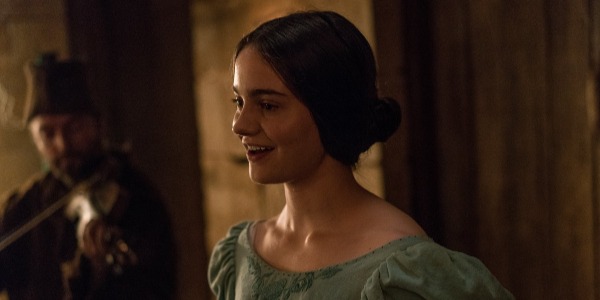THE NIGHTINGALE: An Uncompromising Examination Of The Evils Of Colonialism

Alistair is a 25 year old writer based in Cambridge.…
“Shame on you whore, you’re disgusting!”
This was the heckle that reverberated around the auditorium after The Nightingale received its world premiere at last year’s Venice Film Festival, the applause for the festival’s only female director in competition drowned out by the angry insult from one man, appalled at what he’d just seen. It’s the sort of vile, misogynistic comment that should forever cause shame for the man who yelled it, and one that feels especially tasteless after sitting through Jennifer Kent’s uncompromising sophomore feature, that bluntly details the horrors of colonialism that largely lingers, unresolved in Australian society to this day.
Kent’s film is a powerful work that doesn’t compromise in depicting brutality in order to portray the horrors of the past as accurately as possible – and here was a man resorting to the vile misogyny the film depicts because of how uncomfortable it made him feel.
Smashes the rose tinted romanticisation of an inherently evil past
The Nightingale is designed to make you feel uncomfortable, diving into the horrors of Australia’s past while refusing to offer the catharsis its revenge film narrative appears to offer on paper. A cursory glance at the narrative threatens a revisionist history revenge movie in the same vein as Django Unchained, but Kent has no interest in providing the closure that history is unable to. It’s already proven to frustrate and upset many viewers due to the graphic content and lack of concession to how much brutality the audience can tolerate in a narrative that offers little hope.
Although these reactions are understandable, they only highlight how many of us remain unprepared to confront the full scale of atrocities committed in the past. In Australia, where the annual celebration of Australia Day draws controversy, and in Britain, where mainstream Conservative politicians still wax lyrical over their fondness of the British Empire, a film that smashes the rose tinted romanticisation of an inherently evil past is urgently needed more than ever.

Clare (Aisling Franciosi) is a young Irish convict who is the legal property of British officer Hawkins (Sam Claflin). Hawkins keeps refusing to let her leave with her husband, even though she’s completed the required time under his watch in the penal colony – when her husband drunkenly lashes out at the officers, they follow him home, brutally assault Clare in front of him, before murdering him and the couple’s young baby. The authorities don’t believe that a convict could be a victim of such an attack, and as Hawkins sets off up north in the hope of interviewing for a higher position, she decides to follow them through the hellish wilderness in order to get her revenge. With the help of Billy (Baykali Ganambarr), an Aboriginal tracker hired to help her avoid confrontation on the route, she slowly realises that the closer she gets to revenge, the less likely it is to offer any consolation to the sustained torture she has been put through.
Despite the need to confront historical atrocities, even within a fictionalised narrative, there is a worthwhile discussion to be had regarding a white filmmaker taking the reins of a film detailing the realities of colonial rule. White directors have been using black trauma as an easy route to get awards for many years, and even though Kent’s punishing, uncompromising film has no aspirations on that regard, the conversation as to whether this is her story to tell remains a vital one, regardless of the quality of the finished product.
That her film is centred on a white, Irish woman who is suffering at the hands of colonialism shouldn’t necessarily dilute this conversation. We still see the humiliation and execution of numerous Aboriginal characters who cross Hawkins’ path, and although Kent portrays this bluntly, without sensationalising any detail, there is a worthwhile discussion as to whether this is the best way to confront these atrocities – side characters acting as incidental details to highlight the casual nature of violent prejudice, provided without the hope of catharsis.
No Catharsis, and all the more powerful for it
Aside from a brief scene with an elderly couple, that recalls the awkward Brad Pitt cameo in 12 Years a Slave, Kent’s film is free of any accusations of white saviourism, understanding that colonialism is not something that can (or should) be resolved via a redemptive character arc. I initially had concerns over the power of a film where the evil characters were so repugnantly one note, never developing beyond the villainy with which they were established.
But to do so would be to undermine the history lesson Kent is trying to provide; we’ve become so accustomed to narrative structure, that it can baffling when evil people are portrayed without nuance, even though the history books have never offered those concessions. This is the only responsible way to depict these characters onscreen – repugnant, without remorse, and their actions shown with a cold detachment so we can understand the historical context without witnessing anything sensationalised.

Clare is a complicated protagonist in that she shares many of the same racist beliefs as the officers she’s hunting down, something that Kent frequently lets linger uncomfortably in the air, without ever resorting to use this as a cheap provocation. Racism is systemic in our culture, a manufactured form of hate designed to keep people divided and distracted from a class system that confines people of all cultures. Kent may want us to confront the past, but bubbling under the surface is a substantial message as to how we can best confront our future – a glimmer of hope amidst the misery, telling us that she can’t provide the catharsis, but by educating ourselves and striving to do better, maybe we can.
Which brings me to circle back to the heckle levelled at Jennifer Kent that opened this review. In The Babadook, Kent made the presence of its supernatural antagonist felt even when he wasn’t explicitly shown in the frame. Here, you’re similarly made to feel like you’ve witnessed uncompromising brutality, even though Kent steps back and makes us imagine the most horrifying images for ourself. I was reminded of when test screening audiences called David Fincher sick for showing Gwyneth Paltrow’s head in a box – a shot that doesn’t appear in Se7en, but the scene around it is made to feel so visceral, they imagined they’d seen it regardless.
Through the sound design (be it the wailing of babies, or the screams of victims, accentuating each moment of violence), Kent makes us confront atrocities at close range, while keeping at a distance that means she doesn’t have to capture each attack in full detail. Brutal images linger on our mind without being fully replicated onscreen, making the audience confront the evils of the past while keeping at a distance that ensures nothing onscreen becomes needlessly gratuitous.
The Nightingale: Conclusion
If you’re disgusted, horrified or upset by anything in The Nightingale, then Jennifer Kent has done her job. Using a traditional revenge movie template as her jumping off point, she reminds us that we can have no catharsis for the horrors of the past. All we can do is stop sugarcoating history and make sure we are aware of the full extent of colonialism, so we never repeat it.
What do you think about the depiction of colonialism? Let us know in the comments below!
The Nightingale is released in the USA on August 2, 2019. All international release dates are here.
Does content like this matter to you?
Become a Member and support film journalism. Unlock access to all of Film Inquiry`s great articles. Join a community of like-minded readers who are passionate about cinema - get access to our private members Network, give back to independent filmmakers, and more.
Alistair is a 25 year old writer based in Cambridge. He has been writing about film since the start of 2014, and in addition to Film Inquiry, regularly contributes to Gay Essential and The Digital Fix, with additional bylines in Film Stories, the BFI and Vague Visages. Because of his work for Film Inquiry, he is a recognised member of GALECA, the Gay & Lesbian Entertainment Critics' Association.













